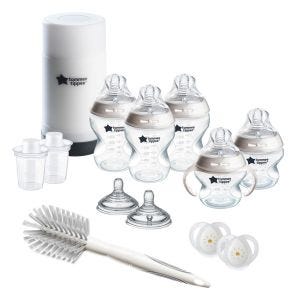
This is a demo store. No orders will be fulfilled.
Subscription orders can be cancelled at anytime. Free delivery on all subsequent subscription orders. Find out more about subscriptions.
They’re easy and fuss free
Your products are automatically sent to you
You save up to 10% when you sign up for a subscription
You can cancel at any time
Pregnancy is incredible and your body goes through so many changes over those nine months. But the truth is, it can also be overwhelming and confusing to keep up with your baby's development and your growing bump!
In this comprehensive guide for first-time parents - or experienced parents looking to refresh their memory - we'll take you through the pregnancy trimesters week by week, and answer some of the most common questions that parents ask along the way.
A typical 40-week pregnancy is broken up into three trimesters. These three periods of time are essential for monitoring a baby's growth, tracking their parent's health, and preparing for birth.
You may also have heard of the 'fourth trimester'. Many people now use this terminology to describe the postpartum period - aka the three months following birth.
Each trimester lasts for 12 or 13 weeks, and this breaks down as follows:
You can work backward from your due date to calculate how many weeks pregnant you are. We have more information on our due date calculator page.
Here's a basic look at how the weeks, months, and trimesters of pregnancy are counted:
Now that you know how many trimesters there are, and how many weeks they last, let's go through some of the key development milestones and changes that happen over the course of a pregnancy.
Weeks one to 12 of pregnancy involve conception, implantation, and organ formation.
It's during this first trimester that an embryo develops into a foetus. You may experience symptoms like morning sickness, fatigue, breast tenderness, headaches, needing to urinate more, constipation, and mood swings. Remember to get plenty of rest and take things easy!
Week 13 to 27 of pregnancy is when most babies start to kick, move, and can turn from side to side. Their swallowing and sucking reflexes will also start to develop, and they'll grow fingernails!
Sometimes known as the 'golden' trimester, it's now when many pregnant people experience relief from their early pregnancy symptoms and generally feel more energized. But as you move through the second trimester, you may experience new symptoms like leg cramps, heartburn, and backache as your body changes to accommodate your growing baby.
Weeks 28 to 40 of pregnancy mark the final stretch in the run-up to birth.
During these weeks, your baby will continue to put on weight and start to look more and more like the little bundle you expect to see at birth. By 37 weeks (full-term), their lungs will be ready to take that first breath.
In the run up to birth, you might experience Braxton Hicks contractions, tightening or aches around your bump, and swelling in your ankles and feet. Time to put your feet up and take things easy when you can!
Babies are born relatively immature compared to other mammals and require continued care and support as they adjust to life outside the womb. The term 'fourth trimester' is sometimes used to describe the three months after a baby is born.
This transitional period comes with different challenges, including physical recovery from birth, hormonal changes, sleep deprivation, feeding difficulties, emotional adjustments, and the overall demands of caring for a newborn. New parents need to recognize that these challenges are normal and that it's ok to seek support if they're struggling.
Deciding when to tell your family, friends, and colleagues about your pregnancy can be challenging, and you're not alone. Many people wonder when the 'right' time is.
The truth is, there's no perfect time and it's a very personal choice, but many people choose to wait until the end of the first trimester (around 12 weeks into the pregnancy) before they share their news.
The first trimester is considered the most crucial period for a developing embryo/fetus and for prenatal care.
If you think you may be pregnant or have questions about early pregnancy, you should seek support from a healthcare professional for accurate information and appropriate care.
To determine your current trimester and approximate due date, you can count the number of weeks from your last period to the present date.
If you're unsure about your trimester or need an accurate assessment, it's best to consult with a healthcare provider. They can confirm your stage of pregnancy and provide you with the appropriate guidance and care.